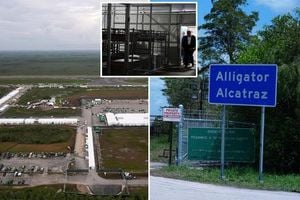Amazon's recent decision to shut down its operations in Quebec has sparked significant upheaval, resulting in more than 4,500 job losses across the region. The company, which previously operated seven warehouses and employed thousands of workers, announced last week it would be laying off approximately 2,000 of its own employees. What many didn’t expect was the ripple effect this decision would cause. The Quebec Labour Ministry has reported another 2,500 individuals, employed by smaller carriers and delivery service partners subcontracted by Amazon, have also lost their jobs, bringing the total to 4,500.
The news of these layoffs has left many workers searching for answers and stability as Amazon shifts its restructured logistics model. The federal industry minister, François-Philippe Champagne, expressed concern over the closures, saying he wished to meet with Amazon representatives to discuss the situation. An official meeting, as of now, has yet to occur. An Amazon spokesperson, Steve Kelly, stated, “We regularly have discussions with officials across Canada to discuss matters of interest. When we make operational decisions like this, we share the news first with employees and then officials.” This suggests Amazon is prioritizing internal communication before engaging with governmental bodies.
While the company has framed this transition as beneficial, citing long-term service and cost savings for customers, the immediate impact on workers has been devastating. The layoffs will take place gradually over the next two months, with Amazon assuring impacted employees will receive severance packages inclusive of transitional benefits such as job placement resources and up to 14 weeks’ pay after closures.
The closures are set to conclude by March 22, and the repercussions on the wider logistics ecosystem are apparent. Notices of mass layoffs have been filed by 23 logistics and transport firms associated with Amazon, also known as delivery service partners (DSPs). These companies were integral to Amazon's former operations, and their abrupt cessation raises concerns about employment opportunities within the region.
A shockwave has spread through the community as individuals grapple with job uncertainty, particularly when many of these employees were promised stability and growth within Amazon's expansive network. Reports indicate the total number of affected workers is staggering; currently, figures suggest layoffs total 4,543. Meanwhile, through its website, Amazon promotes the concept of small local businesses as partners, stating how startup costs can be as low as $15,000 with potential profits ranging from $75,000 to $175,000. Yet, this model raises questions about the sustainability of such partnerships, especially after layoffs hit so suddenly.
What adds another layer of complexity to this story is the relationship between Amazon’s operational changes and recent labor union efforts. Amazon has denied any connection between the warehouse closures and the unionization of 250 employees at the DXT4 facility located in Laval. Critics and labor experts have voiced their opinions, with some linking the recent layoffs to the unsuccessful attempt to contest the union’s bargaining unit, which is believed to have sparked increased fears among workers.
Adam King, assistant professor of labor studies at the University of Manitoba, pointed out the timing of these layoffs, stating, “I think what’s happening here is the clock was ticking down on a first collective agreement.” The reality of this situation indicates workers were at the cusp of negotiating more favorable conditions, but with new challenges presenting themselves, the future of unionization efforts hangs uncertain.
Amazon’s shift back to relying on third-party delivery services resembles operational practices from before 2020 when the company decided to establish extensive warehouse infrastructures throughout Quebec. Prior to those changes, smaller delivery services were responsible for various distribution aspects, leading to concerns among workers as they pondered the fairness of such transitions, especially considering the timing alongside union activities.
The province is home to over 4,400 delivery service partners who, as reported, employ over 390,000 individuals globally across 20 countries since 2018. Quebec remains listed as available for those interested in applying to the DSP program, demonstrating Amazon's commitment to local businesses contradicts its impact on workforce job security.
The future for many of these displaced workers remains precarious as they navigate through job searches, retraining programs, or possible transitions to smaller delivery firms. Unions, too, are contemplating actions to address the grievances of their members amid these sudden shifts.
After the announcement of warehouse closures, Amazon clarified through representative Barbara Agrait it believed the change would bring about reliable customer service alongside economic savings. Yet, these claims seem disingenuous when faced with the true costs—real people losing their livelihoods.
Turning the conversation back to the union side, it remains to be seen whether any legal actions might materialize as labor organizations seek to address the concerns of laid-off workers. With Christmas season logistics peering around the corner coupled with this wave of upheaval, communities within Quebec are left questioning how such integral changes will redefine their workspaces and existing entrepreneurial opportunities.
This site presents not only the immediate human cost of corporate decision-making but also sets the stage for larger questions about the balance of power and corporate responsibility within labor changes.



